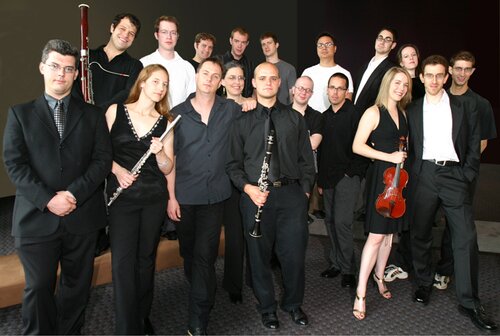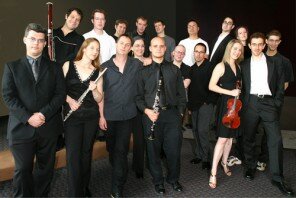Head bobbing and curls flying, Matt Haimovitz plays the cello like a rock star, leaning into his instrument to conjure forth a bold sound that captures your attention. A jack-of-all-trades in the classical music world, the Montreal-based cellist’s career is full of star-studded collaborations (among them Philip Glass, Isaac Stern, and Mstislav Rostropovich, to name a few) but also marches to the beat of his own drum. He was the first classical musician to play at New York’s notorious punk rock club CBGB and currently leads Montreal’s all-cello ensemble, Uccello, performing a repertoire that spans from Bartók to big band.
Haimovitz’s freewheeling style made him the perfect guest artist for Simple Measures, a local chamber music concert series that emphasizes the up-close-and-personal experience (“Any closer and you’d be licking varnish!” proclaims their website). The brainchild of Seattle cellist Rajan Krishnaswami, Simple Measures combines top-notch local talent (and the occasional out-of-town visitor) with eclectic programs of chamber music and a casual concert format, including audience Q&A sessions during the show.
On November 15, Haimovitz arrived in Seattle with a selection of his favorite cello pieces for the first Simple Measures concert of the 2013-14 season. The second of Simple Measures’ “Cello Divas” shows, the performance brought three local cellists — Krishnaswami, Seattle Symphony Assistant Principal cellist Meeka Quan-DiLorenzo, and Central Washington University cello professor John Michel — to join Haimovitz on the Town Hall stage for a celebration of all things cello.
The first half of the program featured six works for solo cello performed by Haimovitz. Ranging from Bach to the Beatles, the short pieces showcased the cellist’s ability to capture and convey the musical essence of a work, no matter what century it was composed. The Prelude from J.S. Bach’s Cello Suite No. 3 in C Major served as the inspiration for the first part of Haimovitz’s mini-recital, which paired the familiar piece with an earlier work by Italian composer Domenico Gabrielli as well as the Seattle premiere of Philip Glass’ Dance Movement for Solo Cello.
All three pieces featured climbing and falling melodic lines that showcased Haimovitz’s ability to lift written notes off the page, making them feel fresh and improvisational. In particular, his interpretation of Gabrielli and Bach took many liberties with tempo, but the dramatic stretching and compression of phrases was convincing and accentuated the natural ebb and flow of each phrase.
A trio of modern pieces based on folk, jazz, and pop traditions followed, immersing the audience in a diverse range of sounds from across the globe. Based on Serbian folk tunes, Lisa Bielawa‘s “Why Did You Lie to Me” alternated between winding melodies and buzzing rhythmic sections. Written as a memorial for victims of the 9/11 terrorist attacks, jazz composer David Sanford‘s “7th Avenue Kaddish” uses the cello to pay homage to John Coltrane’s soulful saxophone in “A Love Supreme” as well as the haunting tones of a Jewish cantor singing a song of mourning.
Haimovitz rounded out the solo portion of the evening with the Beatles, performing an arrangement of “Helter Skelter” by Luna Pearl Woolf, his wife. Full of opportunities to show off his technical wizardry and rock star showmanship, the arrangement had Haimovitz sliding helter skelter up and down the fingerboard, his cello wailing like an electric guitar.
The other three cellists joined Haimovitz on stage for the rest of the program, which featured works for cello ensemble. Again, the repertoire was all over the map, a fun blend of music that represented everything from jazz and tango to Bartok and heavy metal. Composed for Duke Ellington’s big band, Billy Strayhorn’s “Bloodcount” sizzled as a piece for cello ensemble. With Haimovitz comfortable as any jazz musician in the improvisational soloist role, David Sanford’s arrangement captured the soul of the original tune.
Another highlight was Woolf’s arrangement of Bartók’s Roumanian Dances, one of the composer’s most beloved piano works. In Woolf’s four-cello version, the third movement’s faint melancholy melody high on the piano becomes a haunting, otherworldly wail that’s only possible on a string instrument. In contrast, the fourth movement’s low tones rumbled out of Haimovitz’s cello with a tolling sonority that sent shivers down my spine.
A pair of gems by early 20th century composer Bohuslav Martinů were a treat for the ears. Performed by Krishnaswami, Michel, and Quan-DiLorenzo, the two Arabesques contrasted intense layers of glorious cello tones (“Arabesque No. 5”) with light and bubbly splashes of sound evocative of Impressionist composers like Debussy and Ravel (“Arabesque No. 6”). Consistent ensemble playing coupled with a lighthearted mood made for a lovely performance of these rarely-performed works for three cellos.
One of the evening’s unexpected treats was a cover of “Path” by Apocalyptica, a heavy metal cello band from Finland. It turns out that metal’s driving melodies and pulsing beats sound fantastic when rendered on an ensemble of four cellos. The Simple Measures quartet blazed through the arrangement, pulling out all the stops and looking like they were having the time of their lives. Their energy was infectious, and I found myself walking out of Town Hall at the end of the evening humming the song’s main melody.
Krishnaswami and the rest of the Simple Measures crew have a wide variety of offerings planned for the rest of the season. Their next program, with performances on February 14 and 16, features Seattle Symphony principal flutist Demarre McGill. Looking further ahead, concerts in spring 2014 include collaborations with Northwest Boychoir and Spectrum Dance Theater.

